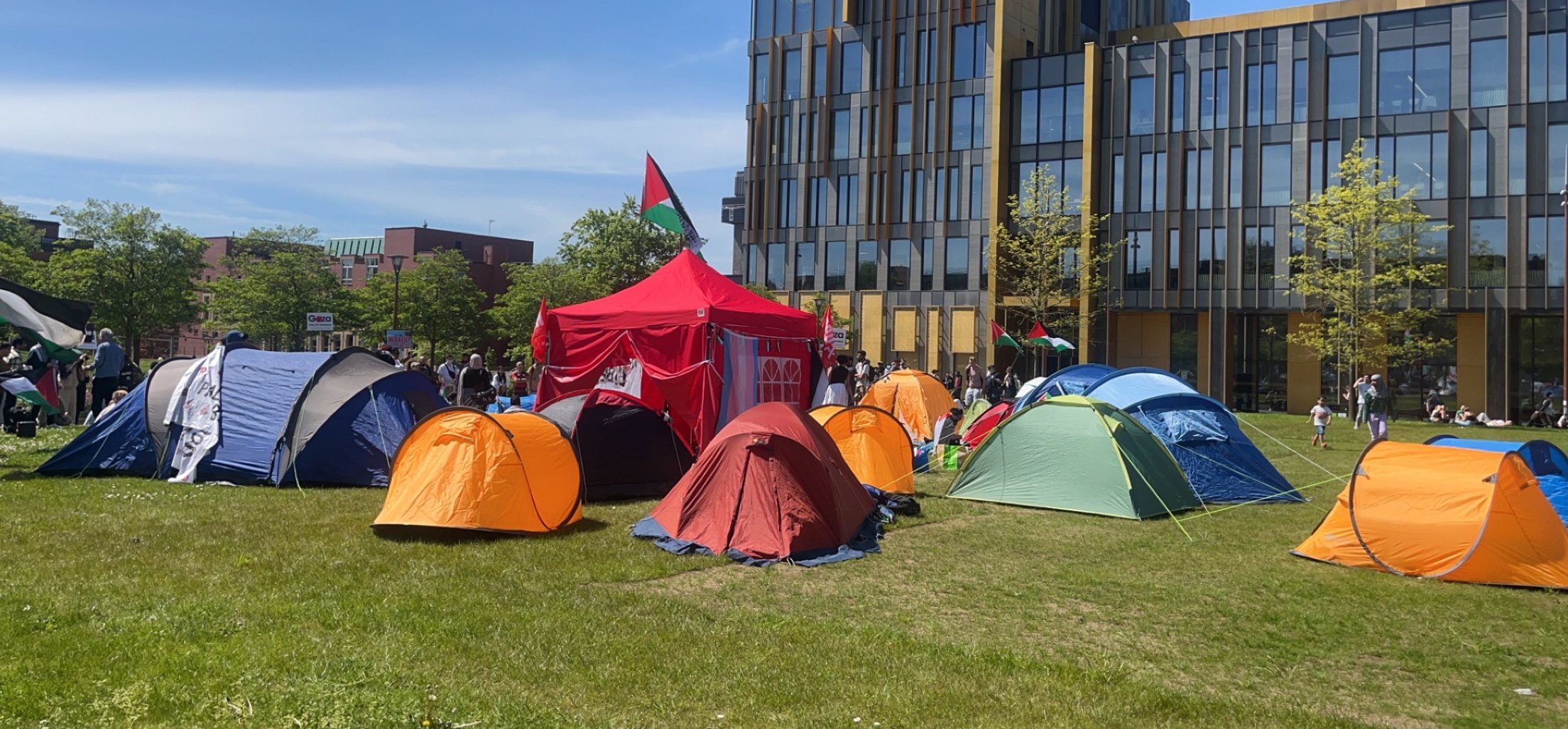
News Writer Anastasia Antoniou and Culture Editor Ilina Jha report on UoB Students Forming Encampment To Protest Against Genocide in Palestine
After several protests and rallies on campus, UoB students have formed an encampment, known as the Birmingham Liberated Zone, in the Green Heart on campus.
Established on Thursday 9th May, students at the encampment are protesting against the UoB’s institutional links with Israel, calling the university to end institutional ties with Israel and to divest its funds away from all companies involved in Israel’s occupation of Palestine. The Liberated Zone also runs education and protest-focused events every day—recent events have included teach outs, art workshops, talks from speakers, a vigil for the healthcare workers killed in the conflict, and a ‘Write a message to the VC’ session.
“UoB students have formed an encampment, known as the Birmingham Liberated Zone, in the Green Heart on campus.
In an open letter addressed to Vice Chancellor Adam Tickell, the Friends of Palestine Society, alongside various other societies and alumni condemned the university’s investments and partnerships due to the humanitarian crisis in Gaza. They highlighted the alleged murders of over 40,000 Palestinians, including women and children, by Israeli forces. Additionally, the letter emphasised the historical context of the Israeli-Palestinian conflict, spanning over 75 years of oppression and ethnic cleansing, and called on UoB to recognize and respond to this context.
UoB Friends of Palestine and Birmingham Liberated Zone have a list of demands directed towards UoB:
- ‘Publicly Apologise for the University’s delay in condemning Israel’s genocide, and for its repression of pro-Palestinian students and staff’
- ‘Release a public report detailing the University’s research, commercial and institutional links with Israel and disclose the University’s external investment managers’
- ‘Divest immediately from all companies linked to Israel, particularly arms manufacturers, complicit in the genocide against Palestinians’
- ‘Terminate all research partnerships with arms manufacturers’
- ‘Cut ties with Israeli Universities’
- ‘Prohibit all investments in arms manufactures by revising the University’s Ethical Investment Policy. Include the Friends of Palestine Society in the annual Investment Sub-Committee meetings’
- ‘Initiate academic and research partnerships with Palestinian universities and offer scholarship programs for Palestinian students’
- ‘Update the University’s code of practice on freedom of speech on campus’
- ‘Publicly address the university’s delayed condemnation of Israel’s actions and repression of pro-Palestinian individuals.’
- ‘Release a report detailing the university’s links with Israel and external investment managers.’
- ‘Immediately divest from companies tied to Israel, especially arms manufacturers complicit in Palestinian genocide.’
- ‘End research partnerships with arms manufacturers and cut ties with Israeli universities.’
- ‘Prohibit investments in arms manufacturers, involving the Friends of Palestine Society in investment meetings.’
- ‘Establish academic partnerships with Palestinian universities and offer scholarships for Palestinian students.’
- ‘Update the university’s code of practice on freedom of speech.’
One of the campers, ‘Mars,’ told Redbrick that ‘[t]he full, detailed list of demands has been sent to the university and is available on our social media pages.’ According to Demilitarise Education, UoB’s top military partnerships are with BAE Systems and Rolls Royce – both companies widely reported to be complicit in the Israeli occupation of Palestine. Mars also explained that the camp protesters are ‘working in solidarity with student encampments across the globe.’ Beginning with students protesting on university campuses across the US, student protests have escalated across the European continent and beyond, as The Guardian reports.
“…the camp protesters are ‘working in solidarity with student encampments across the globe.’
When asked whether there had been any clashes with police or campus security, Mars stated that ‘luckily, there has been no heavy-handedness, which had been an issue with previous protests,’ but that they have been issued an eviction notice because the encampment is unauthorised. When asked about the potential illegality of the encampment, Mars responded: ‘Of course it looks extreme, and it is. None of us wants to be here. This escalation is only because of the university’s failure to respond. We have approached the university for discussion and received pushback. Our meeting [for Thursday 16th May] has been cancelled three times, but they’ve suddenly turned around and put it back on fifteen minutes after it was due to start. This shows that the university is not taking us seriously.’ Mars also added that the encampment ‘is not illegal—university students have the right to be on campus. It is not a criminal charge.’
When asked what others can do to support the encampment, Mars explained: ‘The encampment is open to everyone, no matter what background they come from. They can support our events, support us by hanging out at the camp, and they can even join the camp and stay overnight.’ Mars also added that the protesters are ‘always open to talk to the VC [Vice-Chancellor] if he wants to come.’ Mars explained that ‘the university plays a large part in funding the genocide [in Palestine]. They have the power to change things.’ Mars also encourages those interested in supporting the encampment to follow them on Instagram @bhamliberatedzone.
Redbrick reached out to UoB for comment. They responded: ‘A small group of tents has been set up on campus by individuals protesting in support of Palestine. The University is operating as normal with exams and other activities continuing as planned. The University of Birmingham recognises that students will wish to take part in protests about issues that they care deeply about. There are many ways in which this can be done lawfully, and the profile of a cause raised. Our Freedom of Speech Code of Practice sets out how we support this, including through authorised demonstrations. However, this does not include setting up tents on University property where there is no permission or authority to do so. We are monitoring the situation to ensure safety and minimise disruption, including to students who are currently studying for and taking exams, and other education and wider university activities. We ask that the protestors also respect this.’
“‘The encampment is open to everyone, no matter what background they come from. They can support our events, support us by hanging out at the camp, and they can even join the camp and stay overnight.’
‘Our University community includes staff, students and visitors from a wide range of backgrounds and beliefs. Everyone has the right to go about their business safely and free from intimidation or harassment and we will not tolerate any form of discrimination or racism, including antisemitism and Islamophobia. We maintain regular discussions with a range of student and staff representatives to listen to their views and ensure that they feel supported. We have a wide range of support available to students and staff.’
Students have organised peaceful protests and gatherings, with the main focus of establishing an encampment on campus to press their demands. Student demonstrators have been camped out at US institutions like Columbia University since late April. Although there have been counter-protests, police crackdowns, and press recriminations in those camps, it hasn’t stopped a movement equivalent to that from gaining traction in the UK. Encampments have since been set up in Leeds, Manchester, Warwick, and Lancaster.
The movement has also garnered significant support from the university’s faculty. Over 290 faculty members signed a letter supporting the Student Encampment Coalition, praising the courage and determination of the students. This solidarity between students and faculty strengthens the call for UoB to address the allegations and meet the demands for justice and ethical conduct.
The demands put forth by the Friends of Palestine Society and allied groups aim to align the university’s actions with its ethical obligations and moral duty to support oppressed communities. The outcome of this movement could set a precedent for how universities engage with issues of international justice and human rights.
Read more News updates here:
Gang Violence Intensifies in Haiti, Disrupts National Stability
Russia Elections 2024 and How Putin Will Maintain His Grip on Power

Comments